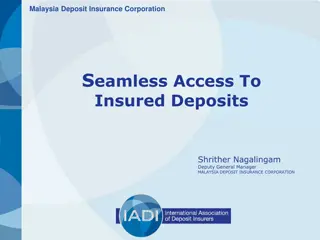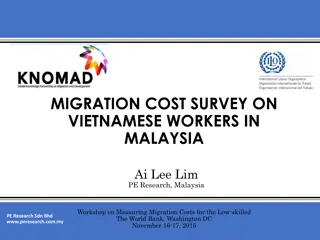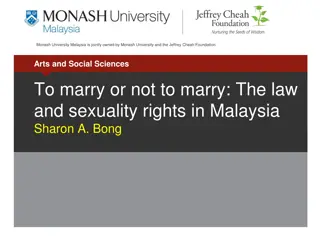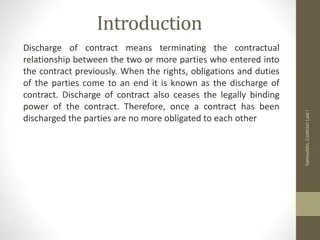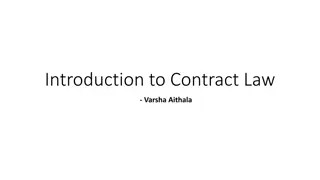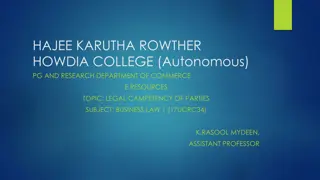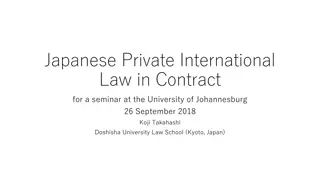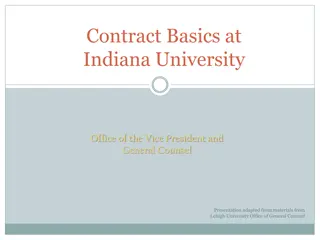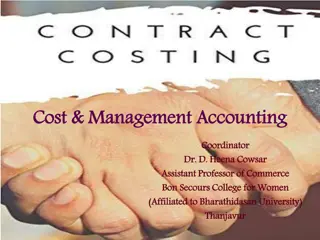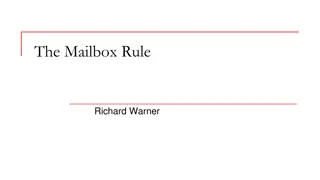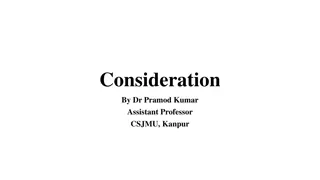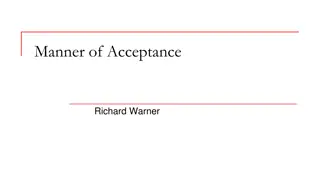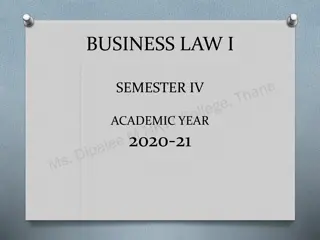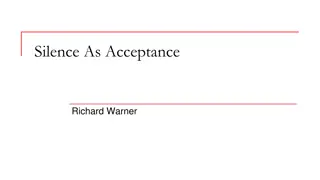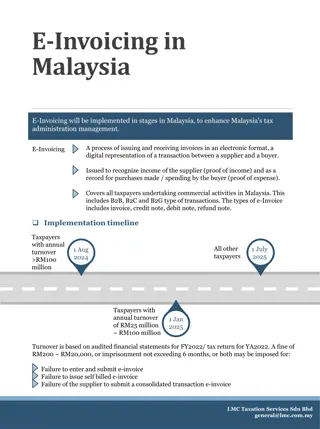Understanding the Law of Contract in Malaysia
The law of contract in Malaysia is governed by the Contracts Act 1950, which defines a contract as an enforceable agreement between parties. Key elements of a contract include offer, acceptance, intention to create legal relations, consideration, certainty, and capacity. This overview explores the concept of offer, distinguishing it from an invitation to treat, and provides examples of invitations to treat in various contexts.
Download Presentation

Please find below an Image/Link to download the presentation.
The content on the website is provided AS IS for your information and personal use only. It may not be sold, licensed, or shared on other websites without obtaining consent from the author. Download presentation by click this link. If you encounter any issues during the download, it is possible that the publisher has removed the file from their server.
E N D
Presentation Transcript
THE LAW OF CONTRACT
INTRODUCTION Definition of contract: An agreement enforceable by law An agreement which is legally binding between the parties In Malaysia, the governing legislation is Contracts Act 1950.
ELEMENTS OF A CONTRACT I. Offer II. Acceptance III. Intention to create legal relations IV.Consideration V. Certainty VI.Capacity
I. Offer / Proposal Section 2(a) of Contracts Act 1950: when one person signifies to another his willingness to do or to abstain from doing anything with a view to obtaining the assent of that other to the act or abstinence, he is said to make proposal An offer is an indication by one party to another party of his willingness to enter into a legally binding contract, on certain specific terms.
Section 2 (c): The person making the proposal is called the promisor Promisor = offeror = proposer The contract comes into existence once the offer is accepted.
A proposal must be a definite promise. The promisor must have declared his readiness to undertake an obligation upon certain terms. It is up to the offeree to accept the offer. Communication of the offer is complete when it comes to the knowledge to whom it is made (Section 4) A proposal made in words (oral or written) is said to be expressed. If a proposal is made other than in words (e.g. by conduct), it is said to be implied (Section 9).
Offer vs Invitation to Treat Not all statement made by a party to initiate a contract will amount to an offer. A person may make a statement of his willingness to enter into a contract by inviting other parties to make an offer, and such statement are referred to as an invitation to treat. An invitation to treat is not an offer It is an offer to receive or induce offer.
Examples of invitations to treat: Display of goods in a shop window Auctioneers invitation for bids Advertisements Tenders Supply of information (A Seller circulating a price list or other promotional materials giving particulars of product for sale is usually said not to be making an offer.)
CASES FOR INVITATION TO TREAT
Display of goods in a shop window Pharmaceutical Society of Great Britain v Boots Cash Chemists (Southern) Ltd Issue: whether there was a sale when customer selected items he wished to buy and placed them in his basket. Held: the display was only an invitation to treat. A proposal to buy was made when the customer put the articles in the basket. The contract would only be made at the cashier s desk when the customer pays for the item.
Fisher v Bell Fact: The authorities charged the df for offering for sale a flick- knife in his shop-window that was against the law. Held: The display of an article with a price on it in a shop window is merely an invitation to treat.
Auctioneers invitation for bids Payne v Cave Held: An auctioneer who puts property for sale is not making an offer but merely an invitation to request for bids. The bid is a proposal or an offer. The auctioneer may accept it by the fall of his hammer or reject it. In this case, since the df withdrew the bid before the fall of the hammer, there was no contract between the parties.
An advertisement The advertisement of bilateral contracts are not offers. The advertisement of unilateral contracts are offers. (offer made to the public)
Carlill v Carbolic Smoke Ball Co. Ltd Fact: Carlill Smoke Ball Co. Ltd advertised that they would offer 1000 to anyone who still succumbed to influenza after using one of their smoke balls in a specified manner in a specified period. The pf duly used it but still contracted influenza. The pf sued for the reward. Held: The pf was entitled to the 1000 as she had accepted the offer made to the world at large
An acceptance can be done in words (express) or by other than words (implied) such as by conduct. Acceptance must be absolute and unqualified so that there is complete consensus. If the parties are still negotiating, an agreement not yet formed.
II ACCEPTANCE When a proposal is accepted, it becomes a promise. Section 2(b) of Contracts Act 1950: When the person to whom the proposal is made signifies his assent thereto, the proposal is said to have been accepted. Acceptance is the exercise of the power by the person to whom the offer has been made, to enter into a contract by signifying his assent in return.
Section 2 (c) of Contracts Act 1950: The person accepting the proposal is called the promisee Promisee = oferee The acceptance can be made in words (express) or by other than words (implied), e.g. by conduct. (Section 9). Acceptance must be absolute and unqualified Section 7(a)
Counter offer vs Acceptance Introduction of a new term may be considered by the court as a counter-offer. It destroys the original offer. Hyde v Wrench Fact The df offered to sell his estate to the pf for 1000 in reply, the pf made a counter-offer to purchase at 950. The df refused to accept the pf s offer. The pf then wrote again to the df, accepting the original sum demanded. Held: No contract existed between them. The pf had rejected the original offer so that he was no longer capable of accepting it later.
Revocation of an Offer and Acceptance As a general rule, when acceptance is complete, an agreement is formed. Therefore, there is no question of revocation. Revocation is possible however, if the acceptance is not complete.
III INTENTION TO CREATE LEGAL RELATION Contracts Act 1950 is silent on this element but it s importance is mentioned in legal cases. This means that the parties to the contract intend that the agreement should be attended by legal consequences.
IV CONSIDERATION General Rule: An agreement without consideration is void. (Section 26) Section 2(d) of Contracts Act 1950: When, at the desire of the promisor, the promisee or any other person has done or abstained from doing, or does or abstains from doing, or promises to do or to abstain from doing, something, such act or abstinence or promise is called a consideration for the promise; In short, the promisee must give something in return of the promise made by the promisor
The function of consideration is to determine that promises are enforced only when the parties have exchanged something of value in the eye of the law. Consideration is broadly defined as something of legal value.
EXCEPTION TO THE GENERAL RULE: An agreement made without consideration is valid in the following circumstances: i. An agreement made on account of love and affection. Pre-requisites need to be complied with:- It is expressed in writing, It is registered (where applicable), and The parties stand in a near relation to each other
ii. See Illustration (c): A find B s purse and gives to him. B promises to give a $50. This is a contract. An agreement to compensate for past act
VI CERTAINTY A contract that is vague or uncertain cannot be enforced. (Section 30 Contracts Act 1950) The terms and conditions must be clear in meaning. When the terms are vague it is difficult for the courts to construe what in actual fact was agreed by the parties and what are the obligations and duties arising from such terms. E.g. Ali agrees to sell to Mary his house for RM 200 000 or RM 30 000. -VOID Ali agrees to sell to Mary a hundred crates of toys without specifying what kind they are. -VOID
VII LEGAL CAPACITY Parties entering contract must competent/ have legal capacity to contract. Section 11 of Contracts Act 1950: A person is competent to a contract is: Of the age of majority - according to law Of sound mind Not disqualified from contracting by any law
Contracts made by infants are void UNLESS in the following contracts: Contracts for necessaries (e.g. food and clothes for infants) Contracts for scholarship (e.g. award, bursary, loan or scholarship) Contracts of insurance An infant over the age of ten may enter into contract of insurance. Written consent from parents/guardian is needed for infants below the age of 16




